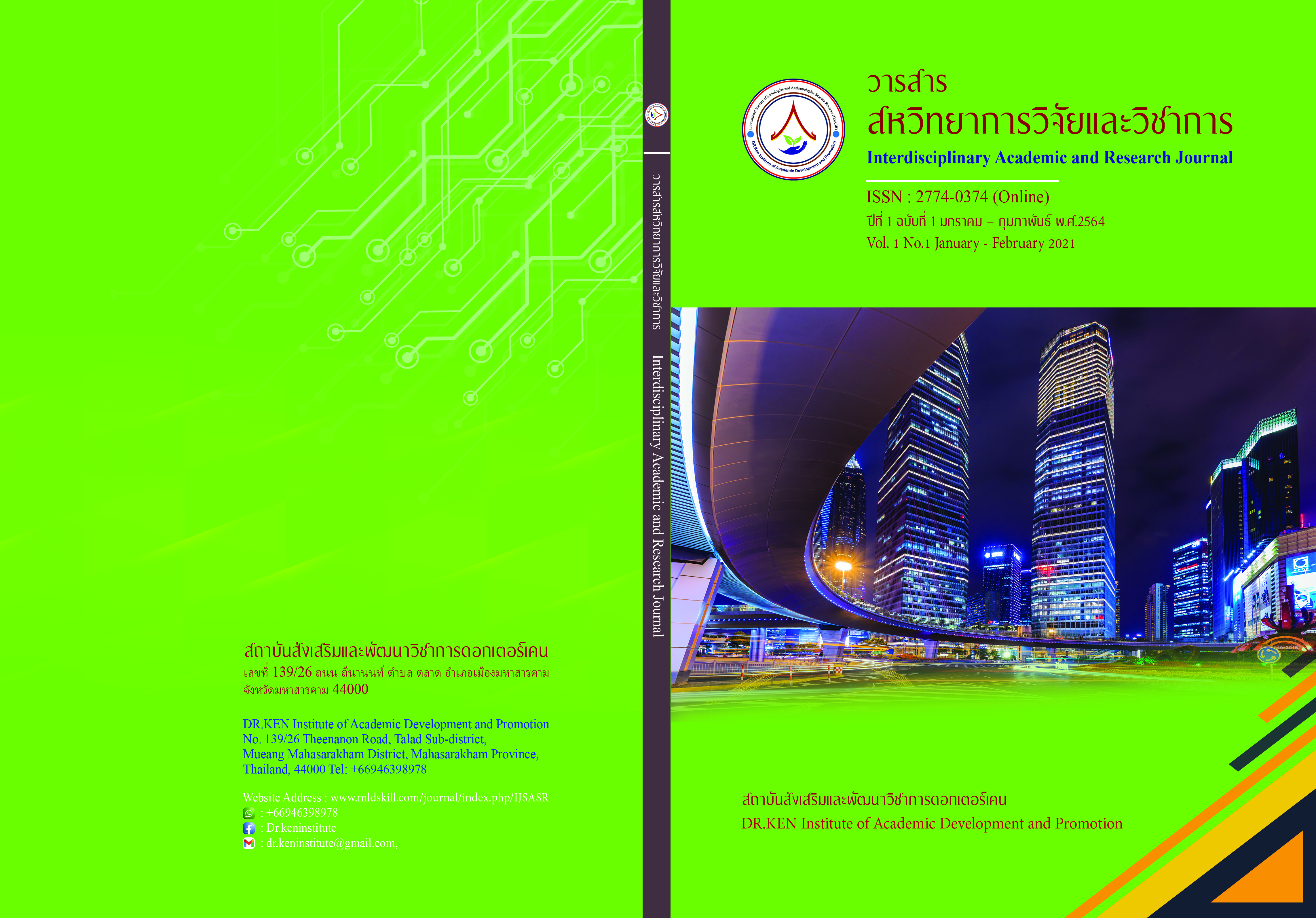The Studying Issues of True Leadership
DOI:
https://doi.org/10.14456/iarj.2021.3Keywords:
Education Issues, True Leadership,Abstract
Organizations in the future tend to have no fixed boundaries, reducing the order of command from a high organizational structure to a flat, flexible, project-based and team-based organization. The trend of employment is temporary employment. Recruit from outside and do not require close interaction. Employees will be more independent. Organizations cannot be controlled or enforced much, but will focus on the exchange of talent and ideas, as well as having a common goal. However, the issue of real leadership education in private school administrators found that; True leadership is significantly related to three components of transformational leadership: Idealized influence, Inspirational motivation, and Individualized consideration.
References
ชัยทวี เสนะวงศ์. (2558). Authentic Leader ผู้นำของแท้. [Online]. สืบค้นเมื่อ 27 กรกฎาคม 2562 https://www.ftpi.or.th/2015/3369.
ธีรภัทร กุโลภาส. (2560).ภาวะผู้นำที่แท้จริง: ความเป็นมาและประเด็นวิจัยในบริบทการศึกษาไทย. วารสารพฤติกรรมศาสตร์เพื่อการพัฒนา, 9 (2), สิงหาคม 2560.
ปิยนันท์ สวัสดิ์ศฤงฆาร. (2560). ผ่าทฤษฎีผู้นำ (ตอนที่ 3). [Online]. สืบค้นเมื่อ 11 กุมภาพันธ์ 2562 จาก: https://drpiyanan.com/2017/06/03/leadership-5/.
รัตติกรณ์ จงวิศาล. (2556). ภาวะผู้นำ ทฤษฎี การวิจัย และแนวทางสู่การพัฒนา. กรุงเทพฯ: สำนักพิมพ์แห่งจุฬาลงกรณ์มหาวิทยาลัย.
รัตติกรณ์ จงวิศาล. (2559). ภาวะผู้นำ ทฤษฎี การวิจัย และแนวทางสู่การพัฒนา. (พิมพ์ครั้งที่ 2). กรุงเทพฯ: สำนักพิมพ์แห่งจุฬาลงกรณ์มหาวิทยาลัย.
วิโรจน์ สารรัตนะ.(2557). ภาวะผู้นำ : ทฤษฎีและนานาทัศนะร่วมสมัยปัจจุบัน.กรุงเทพฯ. ทิพยวิสุทธิ์.
สมศักดิ์ ดลประสิทธิ์. (2559). สภาวะการศึกษาเอกชน : วิกฤตและโอกาส. สถาบันพัฒนาผู้บริหารการศึกษา สป.ศธ. [Online]. สืบค้นเมื่อ 27 กรกฎาคม 2561 จาก http://www.moe.go.th/main2/article/ advice.html.
สันติ บูรณะชาติ. (2558).การบริหารสถานศึกษาด้วยภาวะผู้นำที่แท้จริง.วารสารศึกษาศาสตร์, 26 (3), กันยายน - ธันวาคม 2558.
สำนักงานคณะกรรมการการศึกษาเอกชน. (2554). พระราชบัญญัติโรงเรียนเอกชน. กรุงเทพฯ. สำนักงานคณะกรรมการการศึกษาเอกชน.
สำนักงานคณะกรรมการส่งเสริมการศึกษาเอกชน (2556). บทบาทของโรงเรียนเอกชน. [Online]. สืบค้นเมื่อ 27 กรกฎาคม 2561 จาก : https://sites.google.com/site/prachasampan56/hlaksutr-kar-suksa-1.
Avolio, B. J., & Gardner, W. L. (2005). Authentic leadership development: Getting to the root of positive forms of leadership. The Leadership Quarterly, 16 (3), 315-338.
Avolio, B. J., Gardner, W. L., Walumbwa, F. O., Luthans, F., & May, D. R. (2004). Unlocking the mask: A look at the process by which authentic leaders impact follower attitudes and behaviors. The Leadership Quarterly, 15 (6), 801-823.
Bass, B.M. and Avolio, B.J. (1990) Developing Transformational Leadership 1992 and Beyond. Journal of European Industrial Training, 14, 21-27.
Bill George, (2003). Authentic Leadership: Rediscovering the Secrets to Creating Lasting Value. San Francisco. Jossey-Bass A William George.
Bill George, (2015). Discover your true north. AMARIN. Bangkok. Amarin Printing and Publishing.
Blanchard, K.H. (2006). Leading at a Higher Level: Blanchard on Leadership and Creating high Performing Organizations. Upper Saddle River, NJ: Prentice-Hall.
Fox, J. T. (2011). The impact of personal and organizational identification on the process of teacher trust development within the context of principal authentic leadership. University of Maryland Eastern Shore.
Fry. L.W. (2003). Spiritual Leadership and Organizational Performance: An Exploratory Study. Tarleton State University, Central Texas.
Gardner, W. L., & Avolio, B. J. (1998). The charismatic relationship: A dramaturgical perspective. The Academy of Management Review, 23 (1), 32–58.
Gardner W., Avolio B., Luthans F., May D., & Walumbwa F. (2005). "Can you see the real me?" A self-based model of authentic leader and follower development. The Leadership Quarterly. 16, 343-372.
Gardner, W. L., Cogliser, C. C., Davis, K. M., & Dickens, M. P. (2011). Authentic Leadership: A Review of the Literature and Research Agenda. Leadership Quarterly, 22.
Goleman, D., Boyatzis, R. and McKee, A. (2002). The New Leaders. London: Little, Brown.
Goodwin, V. L., Wofford, J. C., & Whittington, J. L. (2001). A Theoretical and Empirical Extension to the Transformational Leadership Construct. Journal of Organizational Behavior, 22, 759-774.
Jef L Leroy, Marie Ruel, Edward A Frongillo, Jody Harris, Terri J Ballard. (2015). Measuring the Food Access Dimension of Food Security: A Critical Review and Mapping of Indicators. Food Nutr Bull. 36 (2), 167-95.
Liu, Y. (2012). Linking authentic leadership to positive employee health, behavioral engagement, and job performance. (Doctoral dissertation). Louisiana Tech University, LA.
Luthans, F., & Avolio, B. J. (2003). Authentic leadership: A positive developmental approach. In Cameron, K., Dutton, J., & Quinn, R. E. (Eds.), Positive organizational scholarship: Foundations of a new discipline. Berrett-Koehler.
Stewart Wherry, H. M. (2012). Authentic leadership, leader-member exchange, and organizational citizenship behavior: A multilevel analysis (Doctoral dissertation). University of Nebraska.
Walumbwa, F. O., Avolio, B. J., Gardner, W. L., Wernsing, T. S., & Peterson, S. J. (2008). Authentic Leadership: Development and Validation of a Theory-Based Measure. Journal of Management, 34 (1), 89-126.
Downloads
Published
How to Cite
Issue
Section
License
Copyright (c) 2021 Interdisciplinary Academic and Research Journal ISSN 2774-0373 (Online)

This work is licensed under a Creative Commons Attribution-NonCommercial-NoDerivatives 4.0 International License.
Copyright on any article in the Interdisciplinary Academic and Research Journal is retained by the author(s) under the under the Creative Commons Attribution-NonCommercial-NoDerivatives 4.0 International License. Permission to use text, content, images, etc. of publication. Any user to read, download, copy, distribute, print, search, or link to the full texts of articles, crawl them for indexing, pass them as data to software, or use them for any other lawful purpose. But do not use it for commercial use or with the intent to benefit any business.
















.png)


